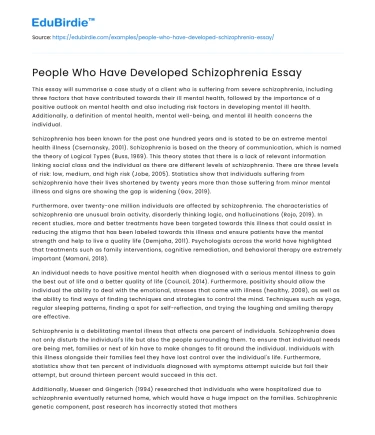Introduction
Schizophrenia is a complex psychiatric disorder that affects approximately 1% of the global population. It is characterized by symptoms such as delusions, hallucinations, disorganized thinking, and impaired social functioning. Despite significant advancements in understanding its pathophysiology, the exact cause of schizophrenia remains elusive. This essay aims to explore the multifaceted aspects of schizophrenia, including its development, impact on individuals, and societal perceptions. By examining real-life cases and scientific literature, this paper will provide a comprehensive overview of the disorder. In doing so, it seeks to highlight the challenges faced by individuals diagnosed with schizophrenia and the importance of early intervention and support systems. Furthermore, this essay will address common misconceptions and counterarguments regarding the nature and treatment of schizophrenia, thereby contributing to a more nuanced understanding of the disorder.
Genetic and Environmental Factors
The etiology of schizophrenia is believed to be a complex interplay of genetic and environmental factors. Twin studies have demonstrated a significant heritable component, with concordance rates of around 50% in monozygotic twins compared to 15% in dizygotic twins (Gottesman, 1991). This genetic predisposition underscores the importance of familial history in assessing the risk of developing schizophrenia. However, genes alone do not account for the disorder's manifestation. Environmental factors such as prenatal exposure to infections, malnutrition, and psychosocial stressors have been implicated in increasing susceptibility (Brown, 2011). A notable case is that of John Nash, the Nobel Laureate in Economics, who developed schizophrenia in his early adulthood. His life story, popularized by the film "A Beautiful Mind," illustrates how genetic predisposition, coupled with environmental stressors, can precipitate the onset of schizophrenia.
Save your time!
We can take care of your essay
- Proper editing and formatting
- Free revision, title page, and bibliography
- Flexible prices and money-back guarantee
While the genetic hypothesis provides a strong basis for understanding schizophrenia, it is crucial to recognize the role of environmental factors in shaping the disorder's trajectory. For instance, urban upbringing, migration, and childhood trauma have been associated with a higher incidence of schizophrenia (Vassos et al., 2012). These findings suggest that schizophrenia is not solely a biological phenomenon but also a social one. This perspective challenges the conventional biomedical model and advocates for a more integrative approach to treatment that considers both biological and psychosocial interventions. By addressing these multifactorial influences, healthcare providers can better tailor their strategies to meet the diverse needs of individuals with schizophrenia.
Impact on Individuals and Society
Schizophrenia profoundly impacts individuals, affecting various aspects of their lives, including cognitive, emotional, and social functioning. The disorder often results in significant impairments in daily activities, leading to challenges in maintaining employment, relationships, and independent living. The stigma associated with schizophrenia further exacerbates these difficulties, contributing to social isolation and discrimination. According to a study by Thornicroft et al. (2009), individuals with schizophrenia are often subject to negative stereotypes, which can hinder their recovery and integration into society. Real-life examples, such as the case of Elyn Saks, a successful legal scholar who has openly shared her experiences with schizophrenia, demonstrate the potential for individuals to lead fulfilling lives despite the disorder.
The societal impact of schizophrenia extends beyond the individual, influencing economic and healthcare systems. The direct costs of treatment, combined with indirect costs such as lost productivity, place a significant burden on healthcare infrastructure (Knapp et al., 2004). Moreover, the lack of adequate resources and support services often results in a revolving door of hospitalizations and inadequate community care. Addressing these systemic issues requires a concerted effort to improve access to mental health services, reduce stigma, and promote public awareness about the realities of living with schizophrenia. By fostering a more inclusive and supportive environment, society can better accommodate the needs of individuals with schizophrenia and enhance their quality of life.
Treatment and Misconceptions
The treatment of schizophrenia typically involves a combination of pharmacological and psychosocial interventions. Antipsychotic medications are the cornerstone of pharmacotherapy, helping to alleviate symptoms such as hallucinations and delusions. However, these medications often come with side effects, leading to challenges in adherence and long-term management (Leucht et al., 2012). Psychosocial interventions, including cognitive-behavioral therapy, family therapy, and supported employment, play a crucial role in addressing the broader psychosocial dimensions of the disorder. These interventions aim to enhance coping skills, improve social functioning, and promote recovery-oriented outcomes.
Despite the availability of effective treatments, misconceptions about schizophrenia persist. One common myth is that individuals with schizophrenia are inherently violent. However, research indicates that people with schizophrenia are more likely to be victims rather than perpetrators of violence (Fazel et al., 2009). This misconception contributes to the stigma and fear surrounding the disorder, hindering efforts to promote understanding and empathy. By challenging these stereotypes and disseminating accurate information, society can foster a more supportive environment for individuals with schizophrenia. Furthermore, emphasizing the potential for recovery and the importance of early intervention can help dispel myths and encourage timely access to treatment.
Conclusion
In conclusion, schizophrenia is a complex and multifaceted disorder that poses significant challenges to individuals and society. Understanding its development necessitates a consideration of both genetic and environmental factors, as well as the broader social context. The impact of schizophrenia extends beyond the individual, influencing economic, healthcare, and social systems. Addressing these challenges requires a comprehensive approach that combines pharmacological and psychosocial interventions while combating stigma and promoting public awareness. By acknowledging the potential for recovery and challenging misconceptions, society can create a more inclusive environment that supports individuals with schizophrenia in leading fulfilling lives. Ultimately, a nuanced understanding of schizophrenia is essential for fostering empathy, enhancing treatment strategies, and improving the quality of life for those affected by this disorder.






 Stuck on your essay?
Stuck on your essay?

